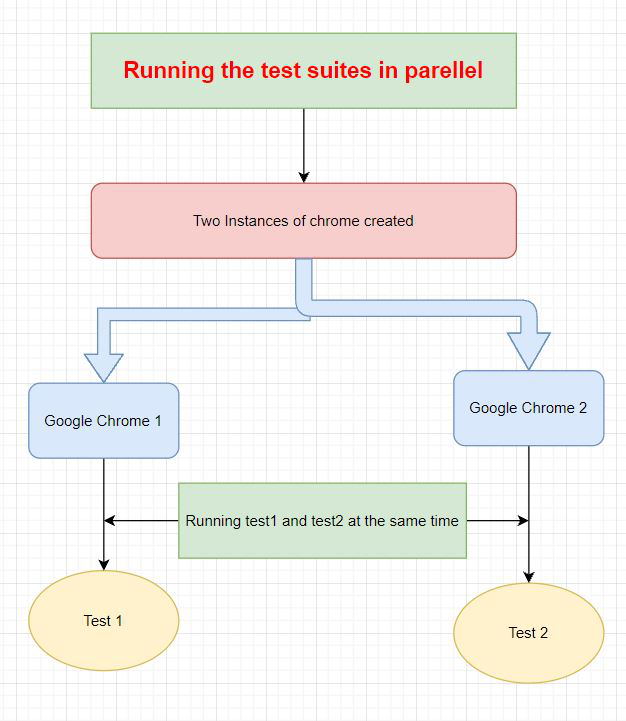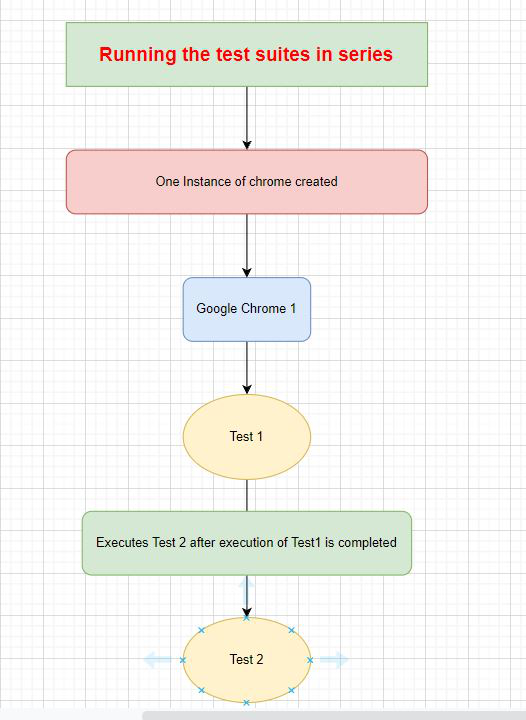如何在Protractor中分片测试文件
Protractor 是为Angular和AngularJS应用程序开发的端到端测试框架。它以真实用户的方式与应用程序交互,在真实浏览器中运行测试。在本文中,我们将讨论如何在Protractor中分片测试套件。
先决条件: 安装和设置Protractor
分片 测试套件意味着并行运行测试套件。假设有两个测试套件,则将这两个测试套件分片并行运行意味着会创建两个Chrome实例,这两个测试套件将在两个不同的Chrome实例上分别运行(即,它们将独立运行),而如果这两个测试套件按顺序运行,那么只会创建一个Chrome实例,然后第二个测试套件必须等待第一个测试套件完成后再运行(即它们无法独立运行)。现在,由于分片可以帮助测试套件并行运行,它将减少执行时间并提高测试的效率。
下面是上述解释的流程图表示:
并行运行测试
连续运行测试
方法:
- 我们将创建一个基本的测试程序,在其中我们将看到如何分片测试套件。
- 所有Protractor测试将有一个包含配置的文件,这将是启动测试的初始文件。
- 让我们创建一个名为conf.js的文件。
- 为了进行分片,可以在conf.js文件的capabilities块中声明两个能力。
- shardTestFiles – 允许不同的规格并行运行。如果此设置为true,则规格将按文件分片(即由此组能力运行的所有文件将并行运行)。默认值为false。
- maxInstances – 此组能力并行运行的最大浏览器实例数。仅在shardTestFiles为true时需要。默认值为1。
步骤1: 我们必须首先创建一个conf.js文件,其中包含用于Protractor的配置。
conf.js
// An example configuration file to
// illustrate sharding
exports.config = {
directConnect: true,
// Capabilities to be passed to the
// webdriver instance for sharding
capabilities: {
'browserName': 'chrome',
// Sharding
'shardTestFiles': true,
'maxInstances': 2,
},
// Framework to use. Jasmine is
// recommended
framework: 'jasmine',
// Spec patterns are relative to the
// current working directory when
// protractor is called.
specs: ['test1.js','test2.js'],
SELENIUM_PROMISE_MANAGER: false,
// Options to be passed to Jasmine.
jasmineNodeOpts: {
defaultTimeoutInterval: 30000
}
};
步骤2: 我们将创建两个名为 index1.html 和 index2.html 的HTML文件。
index1.html
<!DOCTYPE html>
<html>
<head>
<title>
fade-in effect on page load using JavaScript
</title>
<script type="text/javascript">
var opacity = 0;
var intervalID = 0;
window.onload = fadeIn;
function fadeIn() {
setInterval(show, 200);
}
function show() {
var body = document.getElementById("fade-in");
opacity = Number(window.getComputedStyle(body)
.getPropertyValue("opacity"));
if (opacity < 1) {
opacity = opacity + 0.1;
body.style.opacity = opacity
} else {
clearInterval(intervalID);
}
}
</script>
</head>
<body>
<!-- The element to be tested -->
<div id="fade-in" style="opacity: 0;">
Inner text
</div>
</body>
</html>
index2.html
<!DOCTYPE html>
<html>
<body>
<!-- The element to be tested -->
<div id="hidden-div" style="display: none;">
Inner text
</div>
</body>
</html>
步骤3: 我们将创建test1.js文件。在这个文件中,我们将访问index1.html文件,然后等待元素完全淡入。浏览器是由Protractor创建的全局对象,用于浏览器级别的命令,如使用browser.get()方法进行导航。describe和it语法来自Jasmine框架,其中describe是测试的描述,而it定义了测试的步骤。
test1.js
describe('Protractor Demo App', function () {
it('should have a title', async function () {
// Disable waiting for Angular render update
await browser.waitForAngularEnabled(false)
// Get the HTML file that has to be tested
await browser.get('index1.html');
// Get the fade in element
let fadeIn = element(by.id('fade-in'));
// Wait for the fade in process to complete
await browser.driver.wait(async function() {
return await fadeIn.getCssValue('opacity') === '1';
}, 30000, "Taking too long to fade in");
});
});
同样,我们将创建test2.js文件。在这个文件中,我们将访问index2.html文件,然后检查该元素是否隐藏。浏览器是由Protractor创建的全局对象,用于浏览器级别的命令,例如使用browser.get()方法进行导航。describe和它的语法来自Jasmine框架,其中describe是您的测试描述,定义了测试的步骤。
test2.js
describe('Protractor Demo App', function () {
it('should have a title', async function () {
// Disable waiting for Angular render update
await browser.waitForAngularEnabled(false)
// Get the HTML file that has to be tested
await browser.get('index2.html');
// Test if the element is hidden
let hiddenDiv = element(by.id('hidden-div'));
// This test will pass only when
// element is hidden
expect(hiddenDiv.isDisplayed()).toBe(false);
});
});
步骤4: 最后,我们将使用下面的命令运行配置文件。这将运行配置文件,并且测试结果将如下输出所示。
protractor conf.js
输出:
 极客教程
极客教程

